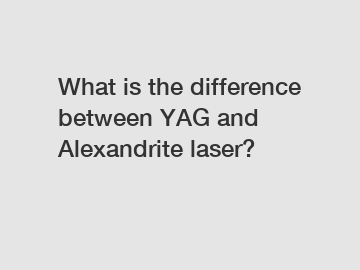Jan. 16, 2024
Beauty Care
What is the difference between YAG and Alexandrite laser?
Lasers have revolutionized the field of aesthetic medicine, offering effective and safe treatment options for various skin conditions. Two popular laser technologies widely used in cosmetic and dermatological procedures are YAG and Alexandrite lasers. But what sets these lasers apart? In this article, we will delve deep into the key differences between YAG and Alexandrite lasers and explore their unique features and applications.
1. Wavelength:

One fundamental contrast between YAG and Alexandrite lasers lies in their respective wavelengths. YAG lasers emit light at a wavelength of 1064 nanometers, while Alexandrite lasers operate at a slightly shorter wavelength of 755 nanometers. This distinction in wavelengths determines the lasers' ability to target specific chromophores in the skin, making each laser suitable for different purposes.
2. Skin Types:
Due to their varying wavelengths, YAG and Alexandrite lasers are better suited for different skin types. The YAG laser's longer wavelength allows it to penetrate deeper into the skin, making it ideal for individuals with darker skin tones, as it reduces the risk of pigmentary changes and other adverse effects. On the other hand, the Alexandrite laser's shorter wavelength is more effective for lighter skin tones, as it specifically targets melanin pigments.
3. Hair Removal:
Both YAG and Alexandrite lasers offer exceptional results in long-term hair removal. However, their mode of action differs. YAG lasers utilize a process called photoepilation, where the laser energy is absorbed by the hair follicle's melanin, generating heat and destroying the targeted hair. Alexandrite lasers, on the other hand, use selective photothermolysis to deliver high-intensity light energy to melanin-rich hair follicles, effectively disabling them. The choice of laser depends on factors such as skin type, hair color, and desired outcome.
4. Tattoo Removal:
YAG lasers have gained widespread recognition for their efficacy in tattoo removal. The longer wavelength of YAG lasers allows them to safely pass through the skin and target the tattoo ink without causing significant damage to the surrounding tissue. Alexandrite lasers, while also capable of removing tattoos to some extent, are not as commonly used for this purpose. The ability of YAG lasers to treat diverse tattoo colors makes them a preferred choice in tattoo removal procedures.
5. Vascular Lesions and Pigmentation:
Certain skin conditions, such as vascular lesions (e.g., spider veins) and pigmentation disorders like sunspots or freckles, can be effectively treated using laser technology. YAG lasers excel in addressing vascular lesions due to their longer wavelength, which is better absorbed by hemoglobin in blood vessels. Alexandrite lasers, however, are more adept at treating pigmentation issues by targeting melanin. Therefore, the choice between the two lasers depends on the specific condition being addressed.
In conclusion, understanding the differences between YAG and Alexandrite lasers is crucial for selecting the most suitable treatment option for individual needs. While YAG lasers with their longer wavelength are preferred for darker skin types, vascular lesions, and tattoo removal, Alexandrite lasers' shorter wavelength makes them more suitable for lighter skin tones, hair removal, and treating pigmentation disorders. To achieve optimal results and minimize any potential risks, it is vital to consult a qualified dermatologist or laser specialist who can determine the most appropriate laser system for your unique requirements.
Want more information on Slim Beauty Machine, 808 Diode Laser Hair Removal, 808 Diode Laser Hair Removal? Feel free to contact us.
Previous: Unlocking the Hidden Power of Secret Strips
Next: Revolutionary Eye Strips for Wrinkles: Ultimate Savior or Just a Trend?
If you are interested in sending in a Guest Blogger Submission,welcome to write for us!
All Comments ( 0 )